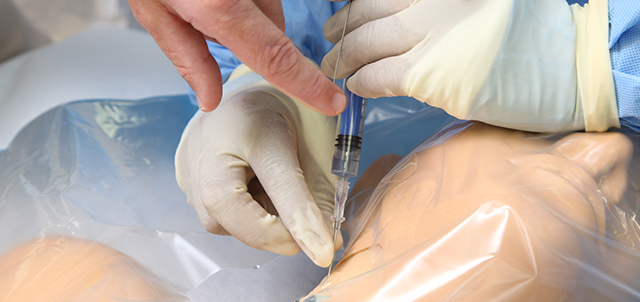The Department of Medicine
Curriculum - Cardiovascular Disease Fellowship Program

The fellowship program is required by the ACGME to train fellows to obtain competency in the following six areas. To accomplish this goal, the program must define the specific knowledge, skills and attitudes as well as the educational experiences needed for residents to acquire. These areas should be considered the six competencies of cardiovascular fellowship training.
-
Patient care that is compassionate, appropriate, and effective for the treatment of health problems and the promotion of health.
-
Medical knowledge about established and evolving biomedical, clinical and cognate sciences and the application of this knowledge to patient care.
-
Practice-based learning and improvement that involves investigation and evaluation of their own patient care, appraisal and assimilation of scientific evidence and improvement in patient care.
-
Interpersonal and communication skills that result in effective information exchange with patients, their families and other health professionals.
-
Professionalism, as manifested through a commitment to carrying out professional responsibilities, adherence to ethical principles and sensitivity to a diverse patient population.
-
Systems-based practice, as manifested by demonstration of an awareness of and responsiveness to the larger system of health care and to use systems resources to provide care of optimal value.
Each rotation month has goals and objectives defined by year in training.
Curriculum Schedule
FY-1
- 3 months of inpatient
- 3 months of cath
- 2 months of echo
- 1 month of heart failure
- 1 month of electrophysiology
- 1 month of nuclear
- 1 month of research
FY-2
- 2 months of cath
- 2 months of echo
- 1 month of heart failure
- 1 month of electrophysiology
- 2 months of research
- 1 month of nuclear
- 1 month of vascular
- 1-2 months of inpatient
FY-3
- 1 month of cath
- 1 month of TEE
- 1 month of research
- 1-2 months of inpatient
- 8 months of elective
Conference Schedule
Cath, Surgery and M&M Conferences
Mondays at 4:30 p.m.
University Cardiology Conference Room
Note: Cath Lecture
The first Monday of each month at 4:00 p.m.
University Cardiology Conference Room
Cardiology Conference
Wednesdays at Noon
Morrison's Conference Room
Echo Conference
First and Third Thursdays at Noon
University Cardiology Conference Room
Electrophysiology Conference
Fourth Thursday at Noon
University Cardiology Conference Room
Research, Multidisciplinary and Health Care Policy lectures are scheduled throughout the calendar year.

Medical Simulation
Simulation is the imitation of real-life experience including the use of task and virtual reality trainers, as well as standardized patients to refine technical and clinical skills of healthcare professionals. At the UT Center for Advanced Medical Simulation, the goal is continual improvement in quality of patient care and safety through education, practice, and assessment. Simulation can replicate almost any diagnostic or therapeutic situation, from simple IV insertions using low-fidelity task technology to complicated surgeries using high-fidelity, computerized manikins or virtual reality modules.
